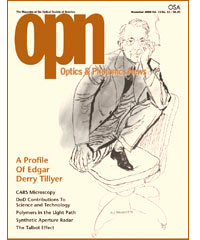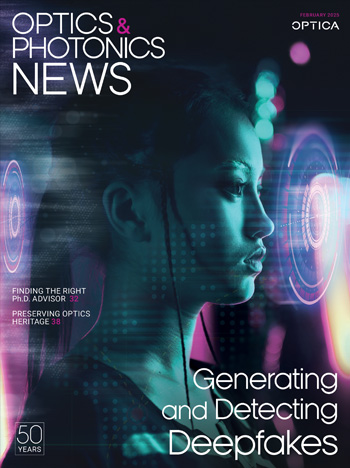
November 2004 Issue
Feature Articles
Polymers in the Light Path
Researchers have experimented with polymer components in optical communications primarily because of a perceived cost advantage over alternatives fabricated from high purity silica and glass. Some polymer materials also provide performance advantages in areas such as tunability and polarization sensitivity.
by Lawrence W. ShackletteSynthetic Aperture Radar
Optics and synthetic aperture radar (SAR) share a history that dates from the earliest efforts in the field of coherent radar imaging. Technological advances have allowed a leap in the utility of SAR as a remote sensing instrument, so that today its effectiveness can rival that of electro-optical/infrared systems.
by Armin W. Doerry and Fred M. DickeyDepartment of Defense Contributions To U.S. Science and Technology
Since the end of World War II, the Department of Defense (DoD) has played an important role in supporting U.S. science and technology. The author describes how his career has benefited from involvement with DoD managers and the impetus provided by DoD funding of basic research.
by William HapperCARS Microscopy for Biology and Medicine
The key requirements imposed on optical imaging techniques for the visualization of living biological specimens are noninvasiveness, chemical selectivity and high sensitivity. Coherent anti-Stokes Raman scattering (CARS) microscopy, which meets all three requirements, casts a new light on vibrational microscopy and paves the way for exciting new applications.
by Eric O. Potma and X. Sunney XieSimple Principles of the Talbot Effect
A well known optics phenomenon finds new applications in emerging fields, including optical computing and optical measurement.
by Changhe Zhou, Wei Wang, Enwen Dai and Liren LiuDepartments and Columns
An Encounter With Optics For Grade School Students
The “Optics Suitcase,” a highly acclaimed potpourri of optics teaching tools, continues to spark interest in optical science among grade schoolers.
The Amazing Career of Optics Pioneer Edgar Derry Tillyer
The lives and scientific achievements of optics luminaries are highlighted in OPN’s occasional column, “Profiles in Optics.” Here, Tim Tillyer, grandson of Edgar Derry Tillyer, describes the career of the great scientist, who was one of the founders of OSA.
Creation of the OSA Technical Council
The OSA Board of Directors, on suggestion of Lucien M. Biberman, created the Technical Council to oversee special meeting sessions devoted to emerging optics subfields that had sparked particular interest among members.
Post September 11 Security Measures Hit Science Hard
Collateral damage stemming from theevents of September 11 have had a profound effect on the world of science. In the aftermath of the terrorist attacks, scientists and government officials have been forced to modify their activities in numerous areas.

![Fiber draped around a hand, demonstrating its flexibility. [Photo by Z. Wang and L. Wei]](https://opnmedia.blob.core.windows.net/$web/opn/media/images/articles/2025/0325/departments/202503-cover-web.jpg?ext=.jpg)

![An artist’s rendering of a pulse of circularly polarized light hitting a 2D semiconductor. [Illustration by S. Alvey / University of Michigan]](https://opnmedia.blob.core.windows.net/$web/opn/media/images/articles/2025/0125/departments/202501-cover-web.jpg?ext=.jpg)